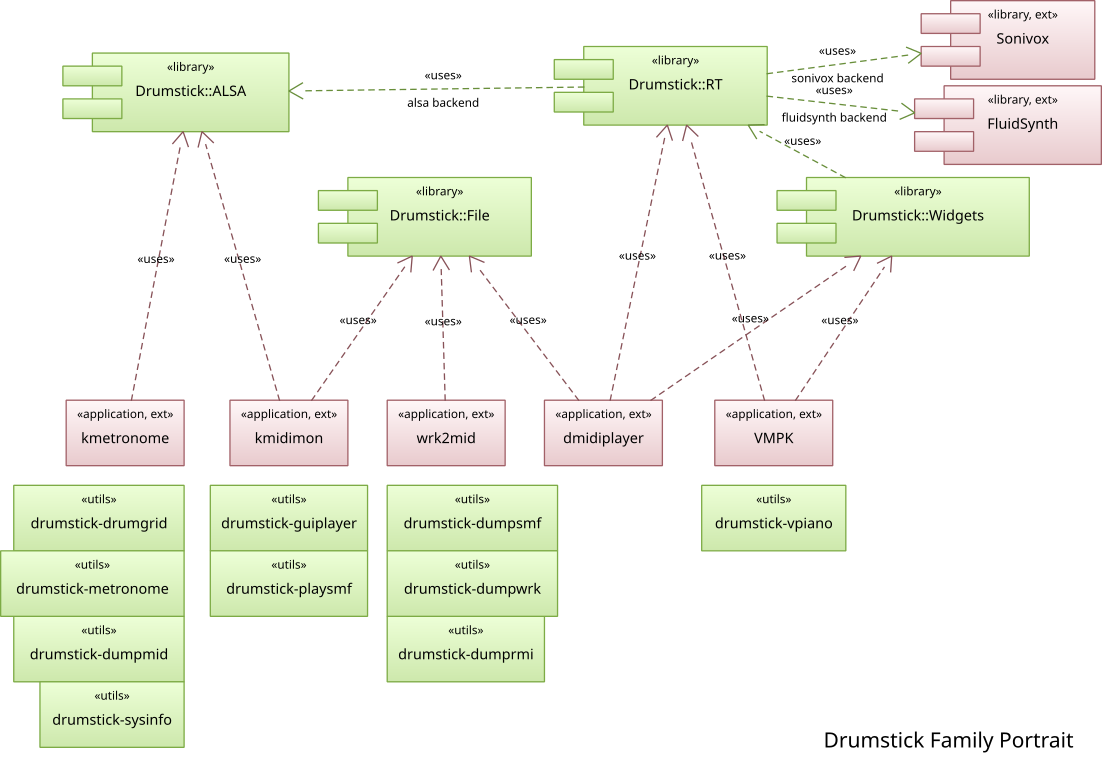In addition to the usual bug fixing, a common pattern across all projects are the changes related to the transition to Qt6, still experimental but mature enough, while keeping compatibility with Qt5. One stopper in this transition is the removal of the QTextCodec class in Qt6 core libraries, moved to the Core5Compat module, risking to be definitely removed at some point in the future. Some methods in Drumstick::File that depend on this class are deprecated now. This functionality is key for data preservation when parsing/importing MIDI files containing text metadata (titles, comments, names, copyrights, lyrics, markers, ...) encoded in any random scheme available in the last 30 years. But the alternative in Qt6 is the QStringConverter and related classes that only supports a very limited set of encodings, mostly Unicode.
This problem deserves deeper thoughts...
If we were talking about pure text files, this could be solved using for instance the iconv command line Unix utility, that converts text files from one encoding to another, for instance from ISO-8859-5 (Cyrillic alphabet) to UTF-8. Then, the new text file encoded in Unicode could be processed by a Qt6 program without limitations. But MIDI files are compact binary structures that can't be processed directly with that utility.
The second root of the problem comes from the SMF nature itself. The Standard MIDI File format was created as an interchange file format, so the music created in sequencers using proprietary storage formats could be exported and retrieved by another sequencer. Sequencer machines and software at one point become deprecated, stopping to work, and can't be used anymore. Composition files created in those systems are now digital garbage for the trash bin, except if the author took the precaution of keeping exported MIDI files. Those are now the equivalent of modern digital manuscripts, which we try to preserve and keep them readable for the foreseeable future within our musical applications.
Changes in Virtual MIDI Piano Keyboard v0.8.6:
- Fixed advanced setting on connections dialog.
- Enabled empty input connection after fix on drumstick-ALSA: requires external connections utility.
- Better inverted piano colors after fix on drumstick-widgets: changed the white keys background picture depending on the key background color.
- Removed dependency on Qt6::Core5Compat when building with Qt6
- Requires: drumstick-2.5
Downloads: http://sourceforge.net/projects/vmpk/files/0.8.6/
Changes in Drumstick MIDI Player v1.5.3:
- After drumstick ticket #37: WRK format markers are supported
- Replaced deprecated signals from drumstick-file when building with Qt6
- Requires: drumstick-2.5
Downloads: https://sourceforge.net/projects/dmidiplayer/files/v1.5.3/
Changes in Drumstick Metronome 1.3.0
- Czech translation updated, by Pavel Fric
- Qt6 compatibility fixes
- New build options: USE_QT and BUILD_DOCS
- Revised and updated documentation system: using Pandoc to create man page and help documents
- New settings: qt style, forced dark mode, and internal icon theme
- Added action icons: internal theme based on breeze
- Desktop icon replaced
Downloads: https://sourceforge.net/projects/kmetronome/files/kmetronome/1.3.0/
Changes in Drumstick MIDI Monitor v1.2.0
- Czech translation updated, by Pavel Fric
- Revised and updated documentation system: using Pandoc to create man page and help documents
- New build options: USE_QT and BUILD_DOCS
- Qt6 compatibility fixes
- Save recording fixes
- Fixed mute track functionality
- Fixed event playback highlighting
- Support WRK file format markers, provided by Drumstick 2.5
- Desktop icon replaced
Downloads: https://sourceforge.net/projects/kmidimon/files/1.2.0/
Changes in WRK2MID v1.1.0
- New build option: BUILD_DOCS.
- New Build option: USE_QT to choose between Qt5 and Qt6. Closes ticket #3.
- Convert WRK track Port parameter. Closes ticket #2.
- Convert WRK markers into SMF text markers. Closes ticket #1.
- Displayed compiled and runtime library version information.
Downloads: https://sourceforge.net/projects/wrk2mid/files/v1.1.0/
Changes in Drumstick Libraries v2.5.0:
- New build options: BUILD_ALSA, BUILD_FILE, BUILD_RT, BUILD_WIDGETS to control building only some of the libraries.
- RT, VPiano: Fixed ALSA and CoreMIDI backends, enabling empty connections (for using external connection tools).
- Deprecation of the Drumstick::File functions affected by the QTextCodec class removal on Qt6.
- Raised macOS deployment target to 10.13 (High Sierra).
- Widgets: changed the white keys background picture depending on the key background color.
- VPiano: new option to display inverted key colors.
- File: WRK format markers processing. Closes ticket #37.
Downloads: https://sourceforge.net/projects/drumstick/files/2.5.0/




